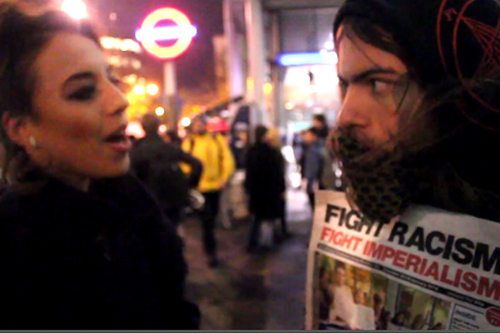
At the start of December 2013, lecturers in the University and College Union (UCU) staged a one-day strike over pay and conditions. Numerous university campuses were occupied, both in solidarity with the lecturers and in protest against privatisation of higher education and attacks on students’ right to organise. The management at various universities have responded with violence. On the evening of 4 December, at Malet Street in London students were savagely attacked by both university security guards and the police.
University of London: an Orwellian nightmare
On Wednesday 4 December, over 100 University of London students occupied the management offices in Senate House – the building which inspired the Ministry of Truth in Orwell’s 1984. Their demands included: an end to the privatisation of Garden Halls; granting of proper sick pay, holiday pay, pension rights and trade union recognition to the outsourced cleaning staff organised in the 3Cosas campaign; and a reduction in pay disparity between the highest paid staff and lowest paid staff. The university responded by sending police and security staff to forcibly evict the protesters, with students being punched, kicked, dragged by their hair across the floor and restrained in painful positions whilst police and security joked and laughed.
The university then obtained a court order banning all forms of occupational protest at Senate House.
This all has occurred in a year in which the university has refused all meaningful dialogue with students, instead choosing to use police to batter through the plans for further privatisation.
On 16 July, an activist was violently arrested by police who stormed the University of London Union (ULU) building, assaulting several students, following a call from university management. The young woman arrested had allegedly chalked a message on a university building in support of the 3Cosas campaign. She is currently being prosecuted on trumped-up charges of Criminal Damage and Assaulting a Police Officer.
On 14 November, ULU president Michael Chessum was arrested for supposedly not giving the police proper notification of a protest the previous day against the proposed closing down of the student union. He was eventually released on bail with draconian bail conditions that he should not ‘engage in protest on any university campus and not within half a mile boundary of any university’ These conditions have since been dropped; however the increasingly frequent use of such restrictions is a clear attempt to intimidate political activists.
On Thursday 5 December, 200 students protested against the police presence on campus and the university’s sickening complicity in criminalising its own students. Through the windows of Senate House, a TSG group could be seen waiting to attack. The demonstration marched up to the gates of the Stewart House entrance on Russell Square, rattling the gates in anger against being locked out of their own campus. Soon afterwards, 11 riot vans appeared, containing 80 police officers, who set about breaking up the protest, with police chasing after protesters and attacking them. At Euston Square police punched, kicked and shoved students; film shot at the scene shows one protester being shoved so hard to the ground that a pool of blood was left on the pavement. The night ended with 38 people being arrested. Some were subsequently released on bail with highly restrictive conditions, such as being forbidden to go within 50 metres of the School of African and Oriental Studies (SOAS) and ‘not to be in a group of four or more persons, including yourself, in any public place’.
A further demonstration took place on Friday 6 December, where again 200 students marched around the campuses of the University of London, dodging police kettles before rallying outside SOAS.
Sussex
On 26 November, for the second time this year, students occupied Bramber House – the earlier occupation having been forcibly evicted on 4 April.
On 3 December, students left the occupation to join the picket lines in solidarity with their lecturers who have faced an average 13% reduction in pay since 2008. Five students were suspended for their involvement with the occupation and support for the strike. Due to sustained protest and complaint from students and university staff, the suspension has now been lifted but the five still face disciplinary action.
On 5 December 500 students and staff demonstrated against the suspensions and further protests are being organised against attacks on the right to protest on campus.
The fight continues…
At other universities which have been resisting privatisation, management has continued to attack the rights of students to organise. At Sheffield, in response to students occupying in protest against privatisation and solidarity with the UCU strike, management took out a possession order that sought to ban all protest on campus without prior consent. At Birmingham, students were forcibly evicted in an early morning raid from the Senate Chambers on 28 November, with the university threatening to arrest two students for occupying. At Liverpool, students occupying in solidarity with the UCU strike were subjected to bullying and harassment, with police officers preventing access to the main room of the occupation and an attempt to lock occupiers in a room without toilets.
However, resistance continues. At Birmingham, students reoccupied with greater numbers on 3 December. At the University of London, students are still protesting against police violence, with a national call out for a demonstration against police on campuses on Wednesday 11 December, seeking to show the link between the fight against the destruction of higher education and the fight for democracy in universities. Sussex students have called for a national demonstration on Tuesday 10 December.
The fightback must continue and intensify. As management seeks to bludgeon opposition to the continued plunder of higher education, a new student movement will have to be built up again. At Sussex, Birmingham and the colleges of the University of London, we see the seeds of a new movement. Let us fight to ensure that they grow and develop.
Victoria Smith




